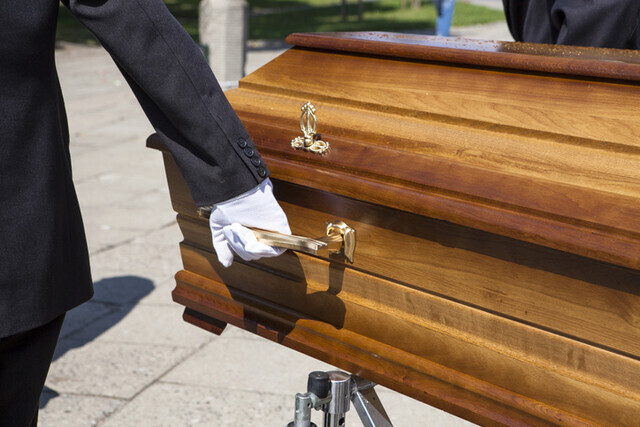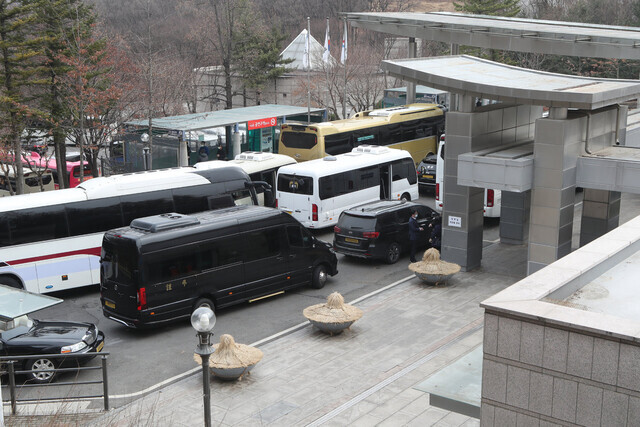S. Korea faces coffin shortage amid fivefold surge in COVID-19 deaths
March 28, 2022
Korea imports of the wood it uses to manufacture coffins from China have dipped

With the number of COVID-19 deaths more than quintupling in South Korea over the past month amid the spread of the virus’s Omicron variant, funeral coffins have been in scarce supply.
While the rising fatalities have driven up demand for coffins, supplies of the Chinese paulownia wood used to make them have been dwindling.
Since the start of March, the supply crunch has been severe, according to sources in the coffin-making community.
“With the sharp rise in orders, not just our ordinary suppliers but also our alternative ones have been unable to provide coffins [when orders come],” said Lee Bae-yeon, who runs the Gangwon Company, a coffin manufacturing business based in Gwangmyeong, Gyeonggi Province.
A representative of another coffin manufacturer in the greater Seoul area said, “Where we’ve ordinarily produced 2,000 coffins in a month, the number recently has been in the range of 3,000 to 3,500.”
“Normally, we stockpiled enough [coffins] for two to three months, but now it’s only enough for two weeks. With lumber in such short supply, we’ve been making some of the coffins with furniture wood rather than coffin wood,” the source explained.

The number of COVID-19 deaths in South Korea has risen sharply in the month of March. While the death tolls for January and February were 1,169 and 1,303, respectively, a total of 6,841 fatalities had been counted for March as of Sunday — more than five times the number of deaths in February.
With the official total not including some individuals who passed away after their COVID-19 isolation was lifted, the actual number of deaths related to the virus is likely to be even higher. The rise in deaths appears likely to continue for the time being, with an average of around two to three weeks passing between patients testing positive and developing critical or fatal symptoms.
The supply issues have been exacerbated by a steep drop in imports of the Chinese paulownia wood used to make coffins.
Lee Sang-jae, who serves as chairperson of the Korean Association of Funeral Directors, explained, “Over 95% of wood used for coffins is paulownia, and most of that comes from China.” Indeed, an examination of Korea Forest Service figures showed China accounting for 100% of paulownia wood arriving in South Korea over the past three months.
But imports of Chinese paulownia have fallen by roughly half in the last two months, with 379,310 kilograms imported in February compared with 750,820 kilograms in December and 609,635 kilograms in January.
Lumber industry sources attributed the dip to restrictions on factory operations during China’s extended New Year holiday and the Winter Olympics in Beijing, along with government lockdown measures on cities to prevent the COVID-19 virus from spreading.
Lee Bae-yeon said, “Ordinarily, we pay for the product [lumber] after receiving it, but now we’re pre-paying the suppliers and then bringing in the product in a kind of stopgap approach [due to the paulownia supply difficulties].”
While larger companies have stockpiles in place, some smaller ones have taken to making plywood coffins as a desperate measure.
The municipally run crematorium in Suwon, Gyeonggi Province, ordinarily does not accept plywood coffins due to the use of adhesives that release atmospheric pollutants upon being burned. Recently, however, it has been allowing for the cremation of plywood coffins due to the shortage of coffins made with paulownia wood.
Cardboard coffins have drawn some attention as an eco-friendly alternative for funerals, but they have not been a popular choice among family members, who prefer to honor their loved ones in a more suitable way.
“In the Gyeongsang Province region, they used to make coffins from willow wood,” Lee Sang-jae noted.
“That could be an alternative, importing willow wood from places like Vietnam, Malaysia, or Indonesia,” he suggested.
“If we don’t come up with alternative measures quickly, we could run short of wood coffins just as we’ve been running short of mortuary space and crematoriums,” he said.